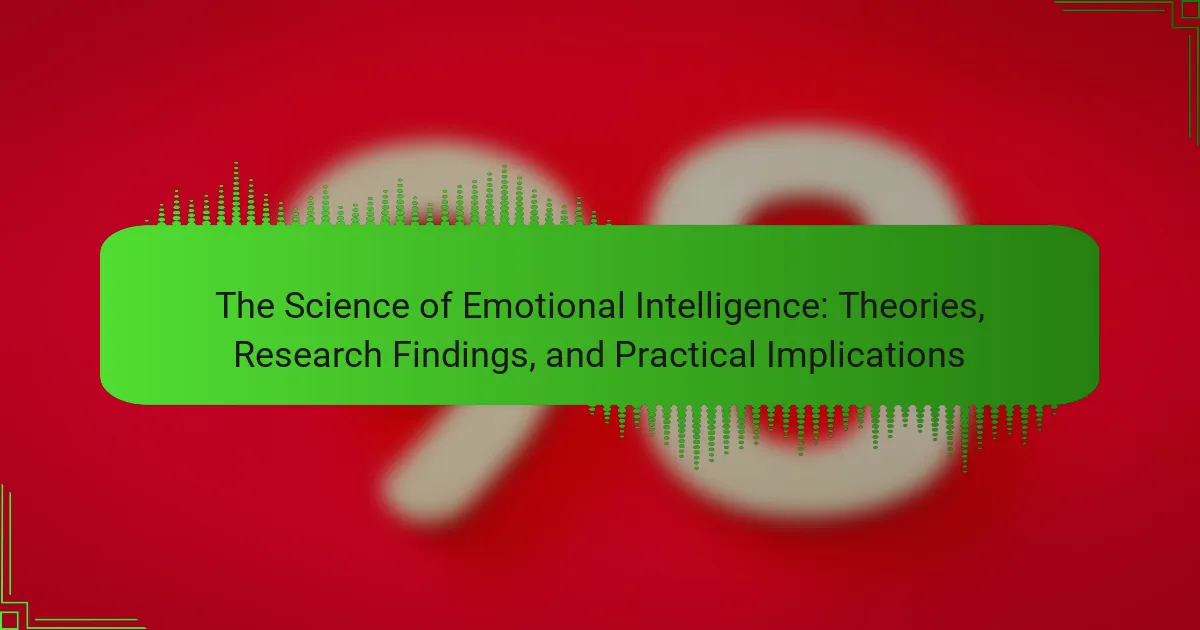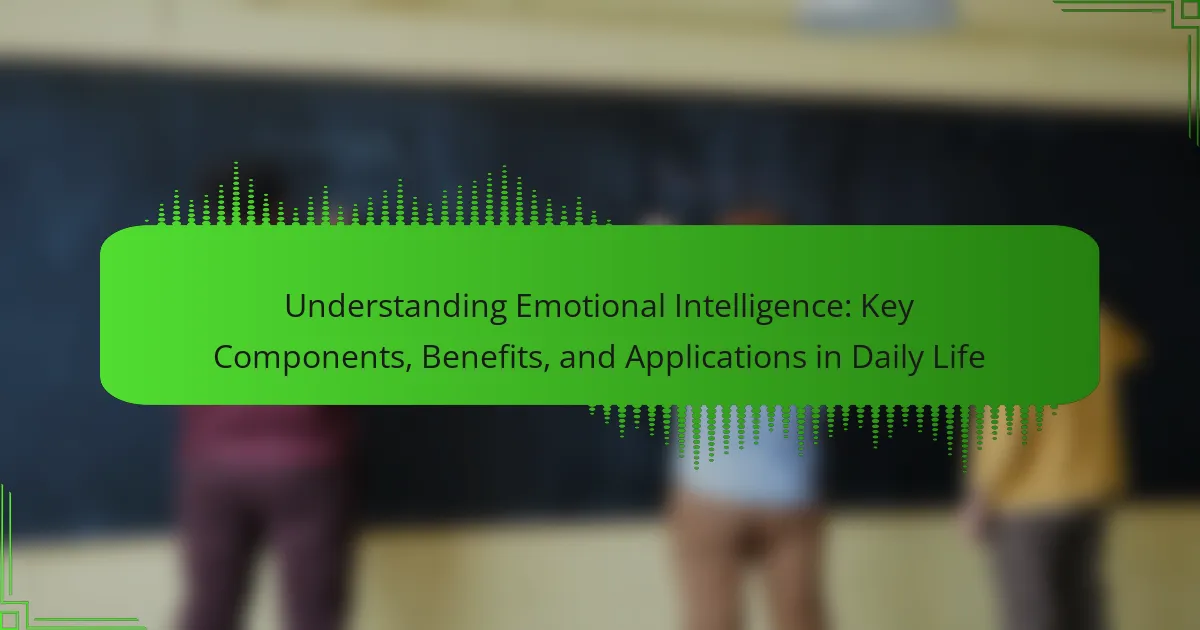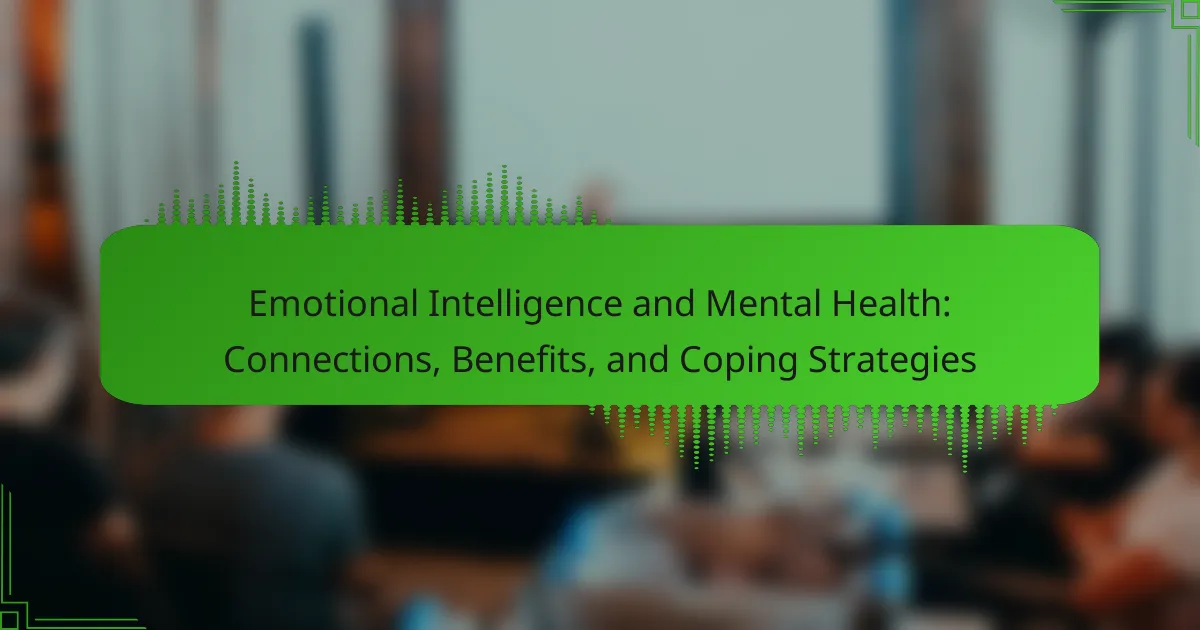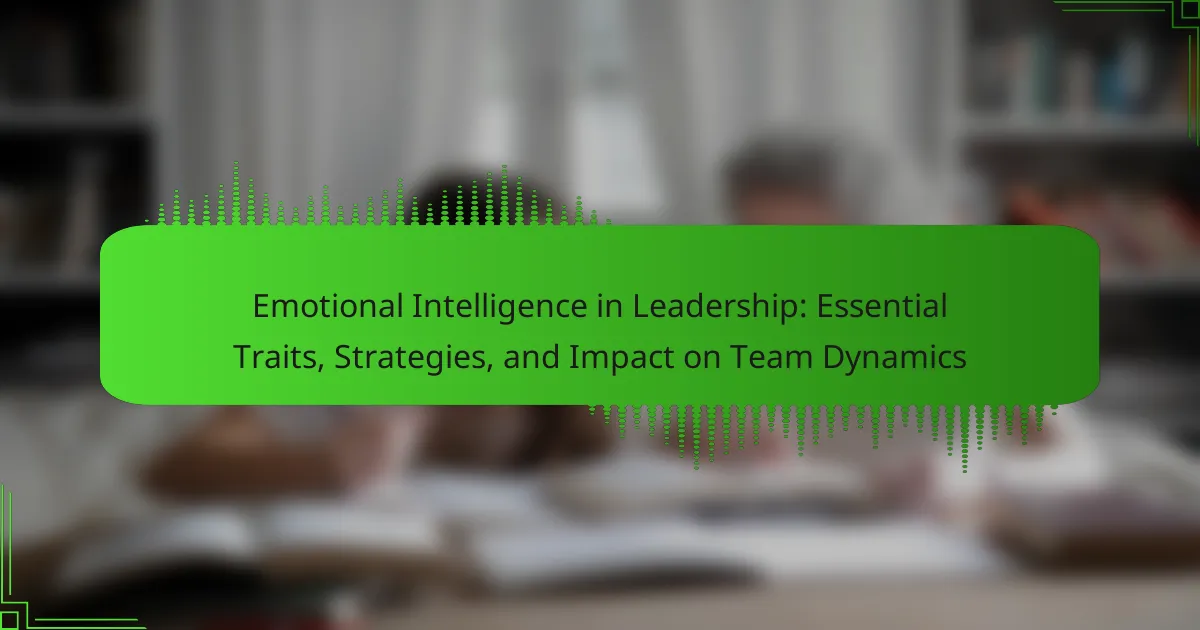Emotional intelligence (EI) is the capacity to recognize, understand, and manage one’s own emotions as well as the emotions of others. This article explores the key theories of emotional intelligence, including the Ability Model, the Mixed Model, and the Trait Model, highlighting their definitions and implications. It discusses research findings that link high emotional intelligence to improved mental health, job performance, and leadership effectiveness. Additionally, the article examines the practical applications of emotional intelligence in various domains such as the workplace and education, emphasizing its role in enhancing communication, collaboration, and overall well-being.
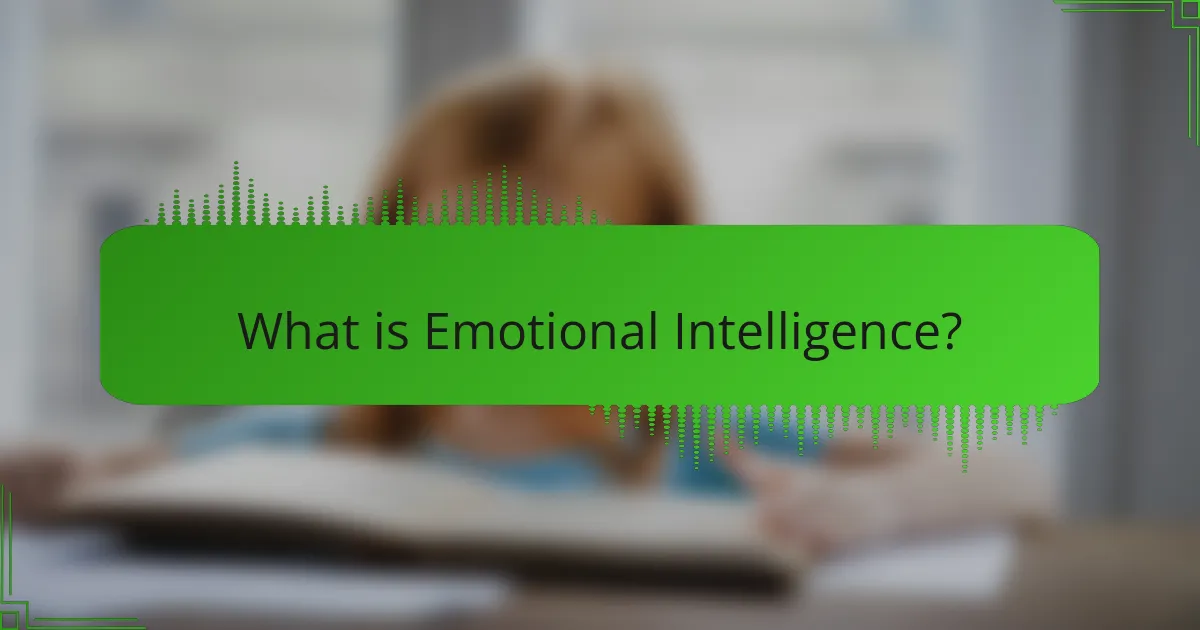
What is Emotional Intelligence?
Emotional intelligence is the ability to recognize, understand, and manage our own emotions and the emotions of others. It encompasses skills such as emotional awareness, empathy, and emotional regulation. Research by Daniel Goleman highlights five key components: self-awareness, self-regulation, motivation, empathy, and social skills. These components contribute to effective communication and relationship-building. Studies indicate that high emotional intelligence can lead to better mental health, improved job performance, and enhanced leadership abilities. For instance, a study published in the Journal of Organizational Behavior found that emotional intelligence significantly predicts workplace success.
How is Emotional Intelligence defined in psychological research?
Emotional Intelligence (EI) is defined in psychological research as the ability to recognize, understand, and manage one’s own emotions while also recognizing and influencing the emotions of others. This definition encompasses several key components. These include emotional awareness, emotional regulation, empathy, and social skills. Studies, such as those by Mayer and Salovey, highlight that EI is crucial for effective interpersonal communication and relationship management. Research indicates that individuals with high EI tend to perform better in social situations and exhibit greater psychological well-being. Furthermore, EI has been linked to leadership effectiveness and workplace performance, underscoring its importance in both personal and professional contexts.
What are the key components of Emotional Intelligence?
The key components of Emotional Intelligence are self-awareness, self-regulation, motivation, empathy, and social skills. Self-awareness involves recognizing one’s emotions and their effects. This component allows individuals to understand their strengths and weaknesses. Self-regulation refers to managing emotions and impulses effectively. It helps maintain control and adapt to changes. Motivation includes intrinsic factors that drive individuals to pursue goals. This component is crucial for personal and professional success. Empathy is the ability to understand and share the feelings of others. It fosters strong interpersonal relationships. Finally, social skills encompass the ability to manage relationships and build networks. These components collectively contribute to effective emotional functioning and interpersonal effectiveness.
How does Emotional Intelligence differ from traditional intelligence?
Emotional intelligence (EI) differs from traditional intelligence (IQ) primarily in its focus. EI emphasizes the ability to recognize, understand, and manage emotions in oneself and others. Traditional intelligence typically measures cognitive abilities, such as problem-solving and logical reasoning.
Research indicates that EI contributes to personal and professional success beyond IQ. A study by Salovey and Mayer in 1990 defines EI as the capacity to process emotional information. This includes the ability to influence others and navigate social complexities.
In contrast, traditional intelligence is often assessed through standardized tests, focusing on analytical skills. Evidence suggests that high EI can lead to better leadership and interpersonal relationships. Emotional intelligence enhances collaboration and conflict resolution, skills not directly measured by IQ tests.
Why is Emotional Intelligence important in everyday life?
Emotional Intelligence (EI) is important in everyday life because it enhances personal and professional relationships. EI enables individuals to recognize and manage their emotions effectively. This skill leads to better communication and conflict resolution. According to a study by the Consortium for Research on Emotional Intelligence in Organizations, high EI contributes to improved teamwork and leadership. Individuals with strong EI are more adaptable to change and stress. They exhibit greater empathy, allowing for deeper connections with others. Research shows that EI is linked to better mental health and well-being. Overall, EI plays a crucial role in navigating social complexities and achieving personal success.
What role does Emotional Intelligence play in personal relationships?
Emotional Intelligence (EI) significantly influences personal relationships. EI encompasses the ability to recognize, understand, and manage emotions in oneself and others. High EI enhances communication, fostering empathy and understanding between individuals. This leads to stronger connections and conflict resolution skills. Studies show that individuals with high EI experience more satisfying relationships. They are better at expressing their feelings and responding to the emotions of others. Research by Brackett et al. (2011) indicates that EI contributes to relationship satisfaction and stability. Therefore, EI plays a crucial role in nurturing and maintaining personal relationships.
How does Emotional Intelligence impact workplace dynamics?
Emotional Intelligence (EI) significantly impacts workplace dynamics by enhancing communication and collaboration among employees. High EI leads to better understanding of emotions, fostering a supportive work environment. Employees with strong EI can manage stress effectively, reducing conflict. Research indicates that teams with high EI demonstrate improved performance and productivity. A study by Cherniss (2010) found that organizations with emotionally intelligent leaders experience lower turnover rates. Additionally, EI contributes to effective leadership, promoting trust and engagement among team members. This creates a positive atmosphere, ultimately driving organizational success.

What are the major theories of Emotional Intelligence?
The major theories of Emotional Intelligence include the Ability Model, the Mixed Model, and the Trait Model. The Ability Model, proposed by Peter Salovey and John D. Mayer, defines emotional intelligence as the ability to perceive, understand, manage, and utilize emotions. This model emphasizes cognitive abilities related to emotional processing.
The Mixed Model, developed by Daniel Goleman, incorporates emotional and social competencies in addition to cognitive abilities. It highlights the importance of emotional intelligence in leadership and personal success. Goleman’s model includes five components: self-awareness, self-regulation, motivation, empathy, and social skills.
The Trait Model focuses on individual differences in emotional intelligence as a personality trait. This model suggests that emotional intelligence can be assessed through self-reported measures and emphasizes the role of emotions in personal and social functioning.
These theories collectively contribute to the understanding of emotional intelligence and its implications in various domains.
How do the Goleman and Mayer-Salovey models compare?
The Goleman and Mayer-Salovey models of emotional intelligence differ in focus and structure. Goleman’s model emphasizes five key components: self-awareness, self-regulation, motivation, empathy, and social skills. In contrast, the Mayer-Salovey model defines emotional intelligence as the ability to perceive, use, understand, and manage emotions.
Goleman’s approach is more practical and applicable in social contexts. Mayer and Salovey’s model is more theoretical and academic. Research shows that Goleman’s model has gained popularity in organizational settings. Mayer and Salovey’s model is frequently used in psychological assessments.
Both models contribute to understanding emotional intelligence, yet they serve different purposes and audiences. Goleman’s model is often utilized in leadership training, while Mayer-Salovey’s model is foundational in psychological research.
What are the strengths and weaknesses of each model?
The strengths and weaknesses of each emotional intelligence model vary significantly. The ability model focuses on the cognitive aspects of emotional intelligence. Its strength lies in its empirical basis and clear operationalization of skills. However, it may overlook the social and contextual dimensions of emotional intelligence. The mixed model combines abilities and personality traits. This model’s strength is its comprehensive approach, integrating emotional intelligence with personality. Its weakness is potential vagueness in defining emotional intelligence. The trait model emphasizes personality characteristics related to emotional intelligence. Its strength is the emphasis on individual differences. However, it may lack predictive validity in practical applications. Each model offers unique insights, but also has limitations that impact their effectiveness.
How do these theories influence the understanding of Emotional Intelligence?
Theories of Emotional Intelligence (EI) shape its understanding by providing frameworks for interpreting emotional processes. For example, Daniel Goleman’s model emphasizes self-awareness, self-regulation, motivation, empathy, and social skills. This model highlights the importance of recognizing one’s emotions to manage them effectively. The Mayer-Salovey model defines EI as the ability to perceive, use, understand, and manage emotions. This perspective underscores the cognitive aspects of emotional processing. Research indicates that individuals with higher EI tend to perform better in social and professional settings. Studies show that EI contributes to better leadership and teamwork. These theories collectively enhance the comprehension of EI’s role in personal and interpersonal effectiveness.
What recent research findings have emerged in Emotional Intelligence?
Recent research findings in Emotional Intelligence (EI) indicate a strong link between EI and workplace performance. A study conducted by Joseph and Newman (2010) found that higher EI correlates with enhanced job performance across various industries. Additionally, research by Schutte et al. (2021) suggests that EI training can significantly improve interpersonal skills and emotional regulation in employees. Furthermore, a meta-analysis by O’Boyle et al. (2011) revealed that EI is a better predictor of leadership effectiveness than traditional intelligence measures. These findings underscore the importance of EI in professional settings and its potential for development through targeted training programs.
What studies highlight the benefits of high Emotional Intelligence?
Studies highlight that high Emotional Intelligence (EI) is linked to improved personal and professional outcomes. Research by Salovey and Mayer (1990) established foundational theories of EI, demonstrating its role in emotional regulation and social interactions. Goleman’s work in “Emotional Intelligence” (1995) emphasized that individuals with high EI tend to excel in leadership and teamwork. A meta-analysis by Joseph and Newman (2010) found that high EI positively correlates with job performance across various fields. Furthermore, a study by Schutte et al. (2001) indicated that higher EI is associated with better mental health and well-being. These studies collectively underscore the significant benefits of high Emotional Intelligence in both personal and professional contexts.
How does Emotional Intelligence relate to mental health outcomes?
Emotional Intelligence (EI) significantly influences mental health outcomes. High EI enables individuals to manage stress effectively. This management leads to lower anxiety and depression levels. Research shows that individuals with high EI report better emotional regulation. They also exhibit healthier coping mechanisms. A study published in the Journal of Personality and Social Psychology found that EI correlates with positive mental health indicators. These indicators include life satisfaction and resilience. Thus, EI serves as a protective factor for mental well-being.
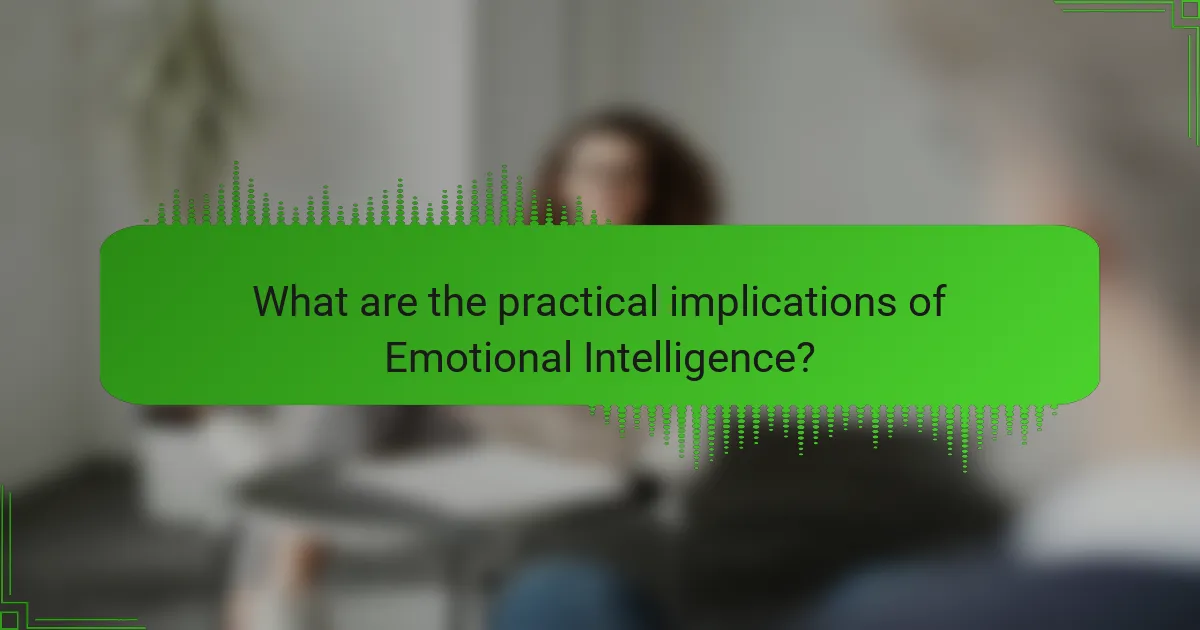
What are the practical implications of Emotional Intelligence?
Emotional Intelligence (EI) has significant practical implications in various domains. In the workplace, higher EI contributes to better team collaboration. Employees with strong EI can manage stress and conflict effectively. This leads to improved job performance and satisfaction. Research shows that organizations with emotionally intelligent leaders experience lower turnover rates. In education, EI enhances student-teacher relationships and academic performance. Students with high EI demonstrate better social skills and resilience. Furthermore, EI is linked to improved mental health outcomes. Individuals with higher EI report lower levels of anxiety and depression. Overall, the practical implications of EI are profound and far-reaching across multiple areas of life.
How can Emotional Intelligence be developed in individuals?
Emotional Intelligence can be developed through intentional practice and learning. Individuals can improve their self-awareness by reflecting on their emotions and reactions. Regular mindfulness exercises can enhance emotional regulation. Engaging in active listening fosters empathy towards others. Participating in social skills training can improve interpersonal relationships. Journaling about emotional experiences can aid in understanding emotional triggers. Research indicates that emotional intelligence training programs can lead to significant improvements in workplace performance (Cherniss, 2000).
What techniques are effective for enhancing Emotional Intelligence?
Mindfulness practices are effective for enhancing Emotional Intelligence. They improve self-awareness and emotional regulation. Techniques include meditation, deep breathing, and body scanning. Research shows mindfulness increases emotional awareness and empathy. A study by Keng et al. (2011) found mindfulness training significantly boosts emotional intelligence scores. Active listening enhances emotional understanding. This involves fully concentrating on the speaker and responding thoughtfully. Role-playing exercises can also develop empathy and social skills. Engaging in feedback sessions fosters self-reflection and growth in emotional competencies. These techniques collectively contribute to a higher Emotional Intelligence.
How can organizations foster Emotional Intelligence among employees?
Organizations can foster Emotional Intelligence among employees through targeted training programs. These programs teach skills such as self-awareness, empathy, and relationship management. Regular workshops and seminars can enhance understanding of emotional cues. Role-playing exercises can help employees practice their emotional responses in real scenarios. Feedback mechanisms can be established to encourage open communication. Additionally, promoting a supportive work culture can reinforce emotional growth. Research indicates that companies with high Emotional Intelligence see improved employee performance and satisfaction. For instance, a study by TalentSmart found that 90% of top performers have high Emotional Intelligence.
What are common challenges in applying Emotional Intelligence?
Common challenges in applying Emotional Intelligence include a lack of self-awareness, difficulty in recognizing emotions, and inadequate interpersonal skills. Individuals often struggle to identify their own emotional triggers. This can lead to ineffective responses in emotionally charged situations. Additionally, recognizing emotions in others can be challenging, which affects empathy. Misunderstanding social cues can result in poor communication and conflict. Moreover, applying Emotional Intelligence consistently requires practice and commitment. Research indicates that emotional regulation is often difficult for many people. These challenges can hinder personal and professional relationships.
How can individuals overcome barriers to improving their Emotional Intelligence?
Individuals can overcome barriers to improving their Emotional Intelligence by actively engaging in self-reflection. Self-reflection enables individuals to identify their emotional triggers and responses. Practicing mindfulness can enhance awareness of emotions in real-time. Seeking feedback from others provides external perspectives on emotional behaviors. Setting specific goals related to emotional skills fosters focused improvement. Participating in training programs can offer structured learning opportunities. Research indicates that consistent practice can lead to measurable improvements in Emotional Intelligence. A study by Goleman (1995) demonstrated that individuals who engage in these practices show significant advancements in emotional competencies.
What resources are available for further learning about Emotional Intelligence?
Books on Emotional Intelligence include “Emotional Intelligence” by Daniel Goleman. This foundational text introduces key concepts and research findings. Online courses are available on platforms like Coursera and Udemy. These courses often feature lectures from experts in the field. Research articles can be found in journals such as the “Journal of Personality and Social Psychology.” These articles provide empirical studies related to emotional intelligence. Workshops and seminars are offered by organizations like the Emotional Intelligence Training Company. These events provide practical applications and skill development. Additionally, TED Talks on emotional intelligence cover various perspectives and insights. These resources collectively enhance understanding and application of emotional intelligence principles.
What are some practical tips for leveraging Emotional Intelligence in daily life?
To leverage Emotional Intelligence in daily life, practice self-awareness and recognize your emotions. Identifying feelings helps in managing reactions effectively. Next, enhance your empathy by actively listening to others. This fosters better relationships and understanding. Additionally, regulate your emotions by taking deep breaths during stressful situations. This technique can improve decision-making. Develop social skills by engaging in conversations and building rapport with others. This enhances your ability to communicate effectively. Lastly, seek feedback from trusted peers to improve your emotional responses. Research shows that individuals with high Emotional Intelligence perform better in interpersonal interactions.
The primary entity of this article is Emotional Intelligence (EI), defined as the ability to recognize, understand, and manage one’s own emotions and the emotions of others. The article provides a detailed overview of EI, including its key components—self-awareness, self-regulation, motivation, empathy, and social skills—as well as its differentiation from traditional intelligence. It discusses the importance of EI in personal relationships and workplace dynamics, highlights major theories and recent research findings, and explores practical implications and techniques for developing EI. Additionally, the article addresses common challenges in applying EI and offers resources for further learning.
